What are 726 seconds? It may seem like a long time, but actually, we are talking about just 12 minutes, less than a quarter of an hour.
If we mortals stop to think about what we have invested in any 12 minutes in our lives to achieve something truly transcendent, we may have a hard time finding an answer. On the other hand, some people, chosen and touched by the hand of the gods, can boast of having put the world at their feet in 12 minutes.
One of those privileged ones is Omara Durand (Santiago de Cuba, 1991), who in 726 seconds won 26 races and 11 crowns in the Paralympic Games from London 2012 to Paris 2024. In all this time, which has slipped away almost as quickly as her devilish pace on the track, the indomitable sprinter also collected 10 Paralympic records and four world records. She was simply overwhelming.
“There are those who have told us, especially the coaches, that they plan from silver to there. The gold is ours. Rivals see it as something unattainable,” Omara reveals to OnCuba.
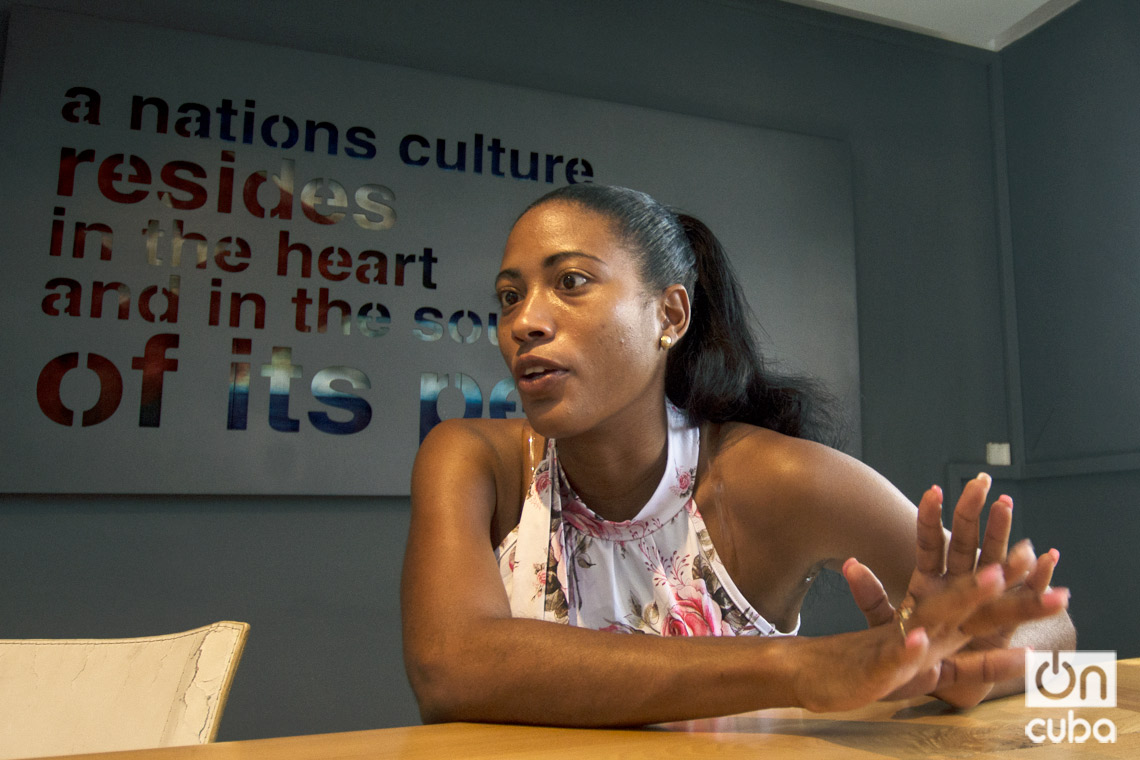
In her words, one can perceive a certain air of grandeur or superiority, but she quickly qualifies what she says and makes it clear to us that, in addition to her speed, what has most distinguished her career is humility: “I say that, just as I appeared one day, another woman who dominates speed can appear, of course.”
For now, that throne of the tracks in the T-12 category (severely visually impaired) has been left vacant after the Paris 2024 Games, which marked her retirement from active sport after almost 25 years of training and sacrifice.
From Santiago to the world
“I started in sport when I was 7 years old. I studied at a school for blind and visually impaired children in Santiago de Cuba. I had a physical education teacher called Reynaldo Gaspar del Castillo, and he realized that I could practice athletics. “It was he who encouraged me to get into this world,” Omara recalls in a direct journey to her origins.
Her story brings to mind innocent passages from her childhood, the birth of her love for athletics and her journey through the different levels of education, both special and regular, in which she learned essential lessons for life, such as being grateful: “I feel eternal gratitude towards all the people who helped me at school; not everyone does that.
“I did not suffer discrimination from the other kids, but in the classroom, everything went faster for me. I went through the distance lessons and I didn’t even watch TV. There I had to find mechanisms to keep going because you can’t stop. I was lucky to find classmates who supported me, who sat next to me to dictate to me what was written on the board,” says Omara.
From that stage, she began to forge an iron personality, always focused on seeking a little more, on pushing the limits: “I have always tried to improve myself and never see a wall in front of me because I have a disability, not see a wall that I cannot cross, feel that I have obstacles in my life. I have also been very optimistic, very positive in dealing with society, with my disability, and feeling good, and fulfilled. My mother says that since I was very young, I set goals for myself, whether in sports or at school, and I still do today. When I face new challenges I breathe better,” says the runner.
With that mentality, she came to the global spotlight at just 15 years old during the World Games organized in São Paulo, Brazil by the International Federation of Sports for the Blind, and then she was at the Parapan American Games in Rio de Janeiro in 2007.
“Getting to an international competition was something big. Imagine, at just 15 years of age. I remember that I was very nervous, restless, insecure, and inaccurate. But one starts with the first time. Then I gained confidence and over time, after trying and trying, I grew. I gained sporting maturity, I understood that I had to be more disciplined and responsible, and that’s how I became what I am today.”
Christchurch-London: the road to fame
From 2011 to 2024, Omara Durand only didn’t win two races between the World Championships and the Paralympic Games. Both “defeats” occurred at the 2019 Doha World Championships, when she finished second in her qualifying heat of the 400 meters and third in the 200m qualifying heat. These events did not have major consequences, because she then dominated the finals of both events.
If we want to find Omara’s other stumbles in significant events, we have to go back in the calendar to 2008. That season, at the Bird’s Nest in Beijing, she made her debut under the 5 rings and was unable to reach the podium in any of the modalities in which she competed. However, that experience at just 20 years old was the basis for her subsequent triumphs, which took almost a cycle to arrive.
“Between the Paralympic Games, there are many competitions, including the Diamond League for people with disabilities, but it has always been difficult to find the funds to participate in these events. That has not changed and after I finished in Beijing I competed very little until the World Championships in Christchurch, New Zealand, where I won my first two gold medals in a top-level championship. That not only made me known but also allowed me to arrive at the London 2012 event with my spirits sky-high,” she explains.
But her breakthrough has no mysteries or secrets, only work: “In the end, I spent the whole year training, on equal terms with conventional athletes. I prepared with the same rigor and dedication, from Monday to Monday, sometimes without time for family or to go out like the 20-year-old that I was.”
Ericka, the girl who ran in London
The London 2012 Games hold a special place in Omara Durand’s memories. At the Olympic Stadium in the British capital, the Santiago native ran three times, set the same number of Paralympic records, and won the 100- and 400-meter titles. But another detail forever marked this event for the Cuban sprinter: she competed while pregnant.
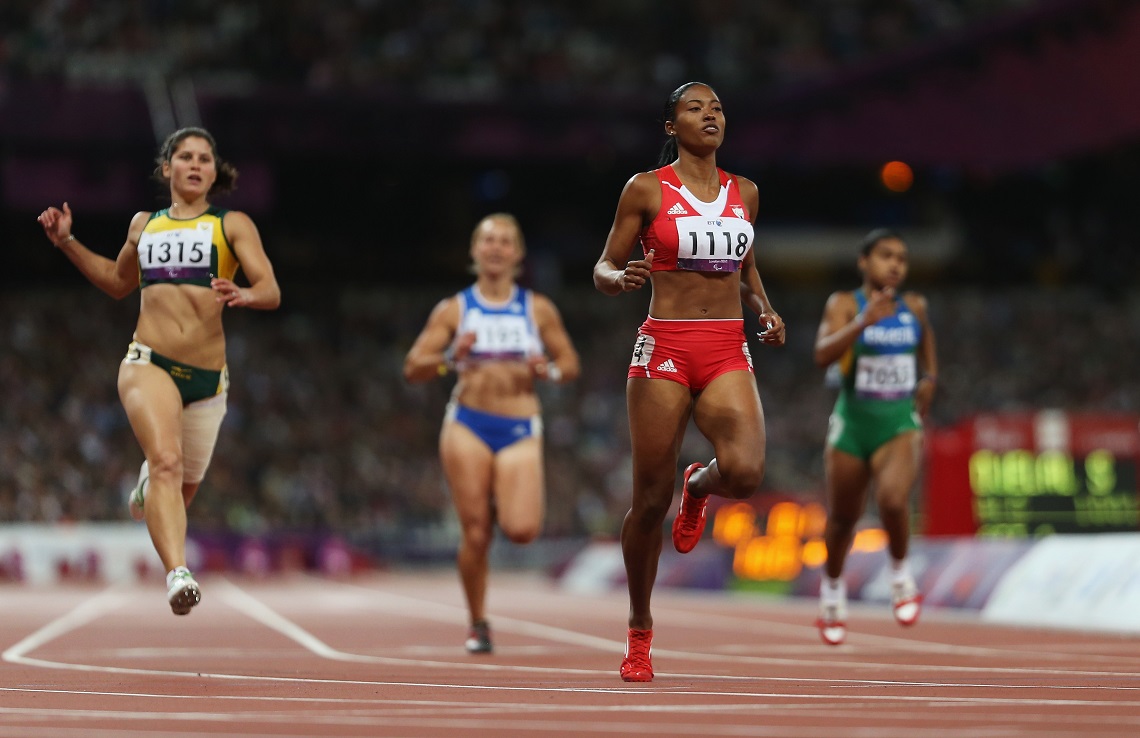
“I didn’t know. I was lifting weights, jumping, doing very dangerous things. If I had known, I wouldn’t have taken such a risk, but since I didn’t know, I did what any athlete normally does before a top-level competition,” reveals Omara.
“I didn’t feel anything. Maybe the level of adrenaline generated by competition, the stress and concentration that athletes must have, didn’t let the body manifest itself,” reflects the sprinter.
Omara found out everything when she returned to Havana: “When I returned to Cuba, they did some tests and it turned out that I was pregnant. I had nothing planned, but when I heard the news, it was welcome a blessing. I had Ericka in 2013 when I was only 21, and it didn’t cause me any problems in my sports career, because three months after giving birth, I gradually returned to work. After becoming a mother, I obtained the best sports results of my life.”
Genesis of an explosive couple
Although motherhood was not an obstacle for Omara Durand to return to training, her return to top competition was conditioned by reclassification to define in which category she would compete. The Santiago native had been competing in the T-13 (visually impaired), which does not require a guide, but after having her daughter, some things changed.
“The classification is defined by ophthalmologists from the International Paralympic Committee. They have a platform of doctors and based on studies they decide in which category we will compete. In my case, every 2 years I had to go through that reclassification, and after motherhood, they determined that I had to go down to T-12, in which the guide is not mandatory, but I felt that I needed it to perform better in certain circumstances,” says the sprinter.
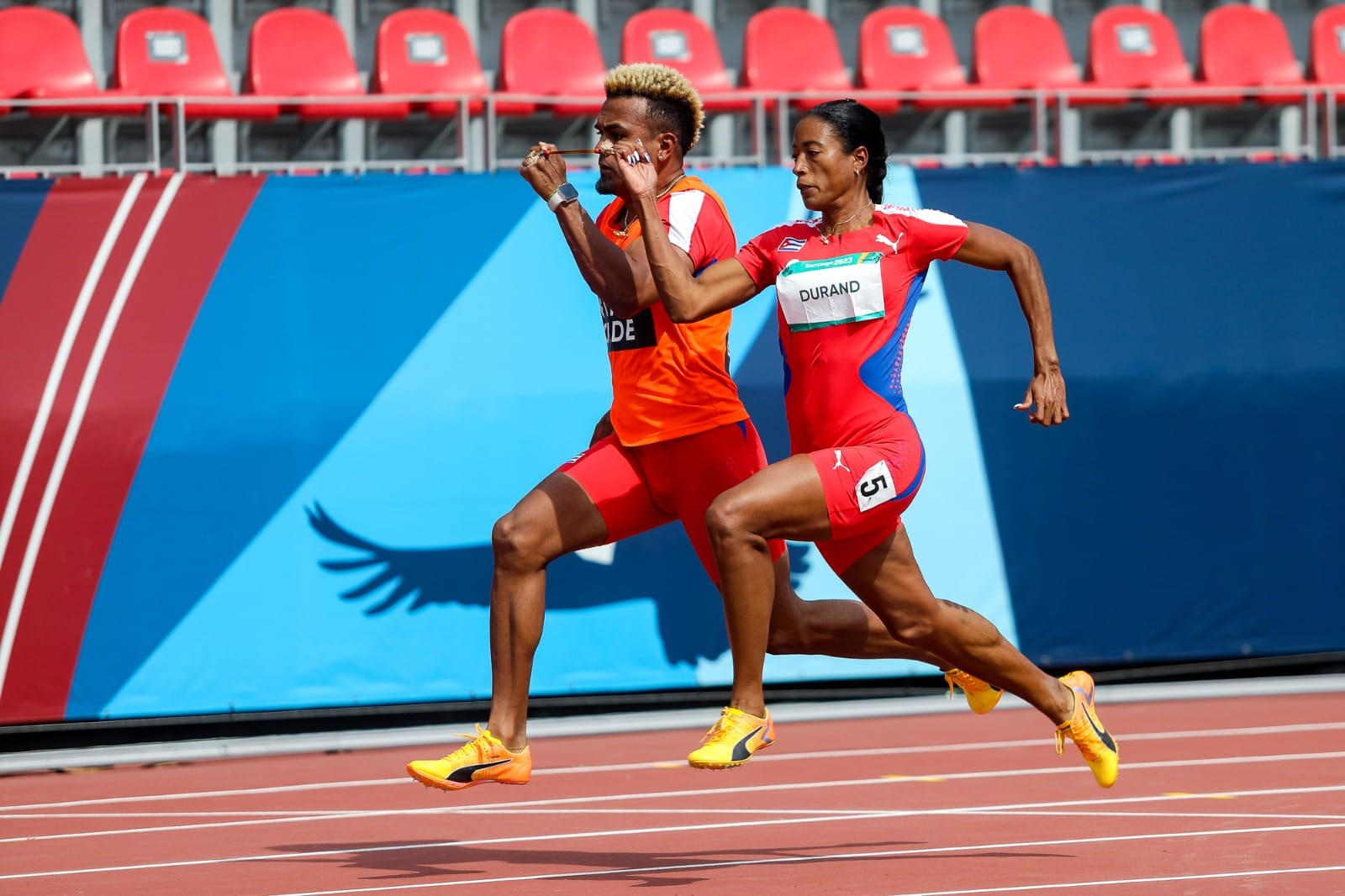
“In the big events, for example, I almost always had to compete at night, and everything was very difficult for me there. Other times I had to run while it was raining and it also created situations for me with the issue of visual impairment. So, together with Professor Miriam Ferrer, my coach, and the rest of the technical team, we decided to look for a guide,” says Omara, who initially had a strange feeling of uncertainty.
At first, she didn’t know how the partnership would work and whether running alongside another person would limit her performance. However, her doubts were quickly dispelled, at least in the competitive arena, because in the first pair test during the 2015 Doha World Championships, they broke all the records: 4 world records and a gold medal in the 100-, 200- and 400-meter dashes.
Yuniol Kindelán, the other half
Industria, between Habana and Barcelona, just behind the Capitol. Yuniol Kindelán grew up there, and from his childhood, he doesn’t remember doing anything other than wearing out the soles of his shoes and devouring miles of asphalt in the heart of the Cuban capital.
“I was always into athletics. I would spend the day running and that’s how I started practicing sports. I then climbed the famous pyramid to the national team, but I didn’t last long,” Yuniol recalls with a certain nostalgia, hiding behind elegant glasses and a very characteristic hairstyle.
Omara Durand’s squire, her other half on the track, embraces fame today after a decade of success, but his career was very close to moving away from the spotlight: “In the national athletics team every year they ask you for a record to continue and I didn’t achieve it, so they kicked me out. I was left in limbo.”
Was it traumatic?
Of course, but that is part of the sport, an almost hidden one because usually successes are always written about, not defeats. I trained, I sacrificed myself, I gave my best, but the record didn’t come out. It was a blank moment, although fortunately brief, because just a few days after leaving the national team Miriam Ferrer spoke to me about the possibility of competing with Omara and we started working.
What did you feel at that moment?
Honestly, I thought it was going to be very difficult. I had never run with anyone and neither had Omara. Besides, she already had great results and it was a tremendous challenge to maintain them, but we assumed it, although at the beginning it was a disaster. It is not what people are used to seeing, what happens is that we are responsible with the work, very serious, and in the long run, we achieved the necessary rapport and to this day.
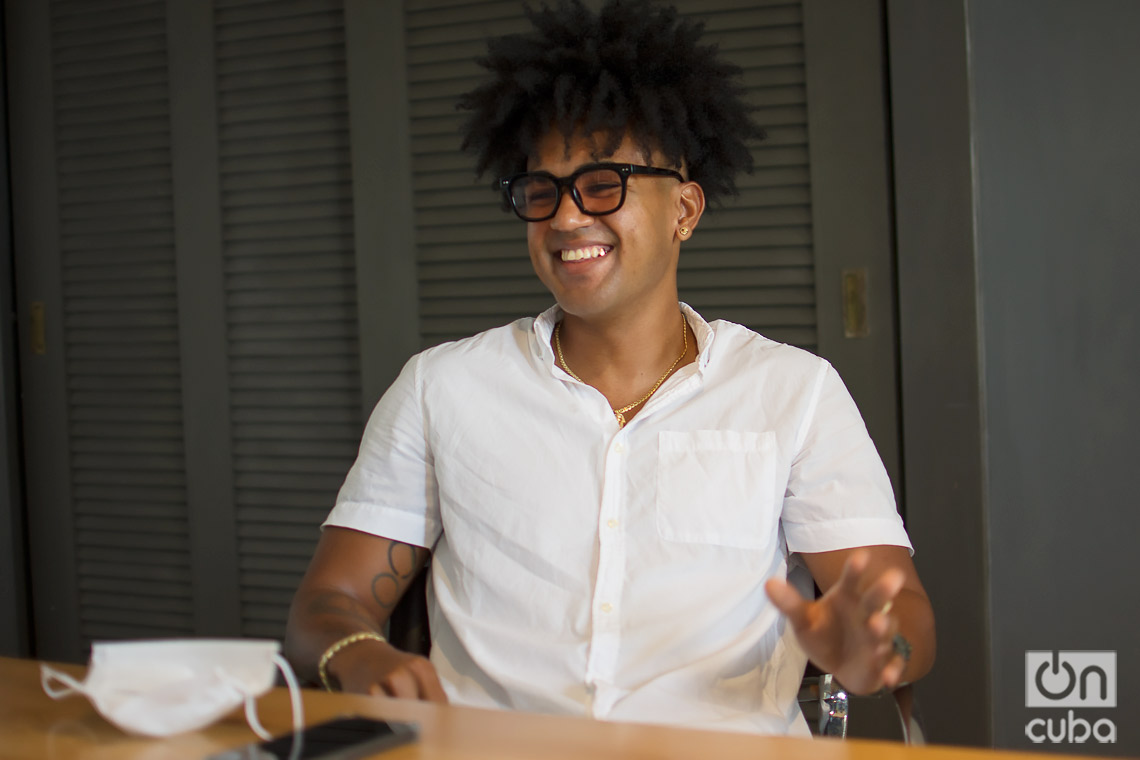
Did you imagine such a promising future when you were let off?
No, never. I never thought I would get so far. Also, sports for the disabled did not get much attention, it was hardly shown on television or talked about in the media, only at the Paralympic Games and that was it. So, I did not know at all what I was facing. At first, I said: “What am I supposed to do here? I don’t understand!” I really couldn’t imagine that after that we would go so far.
The change for you was drastic, not only by moving to Paralympic sport but also by facing new distances…
Yes, I was always a 400-meter runner, I hadn’t competed as such in speed, so it was a bit complex at the beginning, especially in the 100. Because of starting issues and other technical issues, it was quite difficult for me, but I polished them and improved.
Was that the most difficult thing about those beginnings?
No, not at all. The most difficult thing was synchronization for the two of us. We knew how to run, but doing it tied with a rope and in short distances with very little margin for error became more complicated. In this type of race, you can’t make a mistake because you lose almost all chance of winning. When we managed to synchronize everything went well.
The perfect silhouette
With a suitable camera shot, it gives the impression that Omara Durand and Yuniol Kindelán are one body that leaves its trail on the track at the speed of light. Their silhouette is exquisite and barely blurred when the Santiago native steps forward after crossing the finish line. Many runners spend years seeking these levels of perfection and sometimes fail, but the Cuban duo found the key in a matter of a year.
Omara and Yuniol began working together before the Parapan American Games in Toronto, but the Havana native was unable to make the trip to that event and their debut together was delayed until the World Championships in Doha, at the end of 2015. Although they claimed all the vacant crowns there, their true test of fire came the following year at the summer event in Rio de Janeiro, Brazil.
For those Paralympic Games, Cuba was already facing a challenging scenario, as Yunidis Castillo, the queen of the Cuban teams in Beijing 2008 and London 2012, did not seem in a position to repeat her feats on the track. In fact, in the Brazilian city, she only managed to get second place in the long jump and came away empty-handed in the races.
Omara was then the candidate for Yunidis’ throne and claimed it in a big way, consolidating one of the most spectacular individual dynasties in Paralympic sport. However, her time in Rio 2016 was a major challenge, since for the first time she competed with someone under the 5 rings and she did so alongside a guide with whom she had only worked for a few months.
“We were having synchronization problems that we had a hard time solving, until one day, after hearing Miriam’s complaints for a long time, everything went perfectly. It was hard work at the start and the coordination of the arm and leg movements. But we did it and it never failed us again. We got to a point where we could stop training or do it without the rope and when we came back it would work out wonderfully,” explains Omara.
Although it may seem like a routine exercise now, the reality is that achieving that rapport and drawing a perfect silhouette on the track is only for the chosen ones: “I think we achieved that based on our sporting level, my ability as an athlete and Yuniol’s as a guide. On the other hand, we have similar physical characteristics, such as height. In some pairs it is not like that, you find very tall guides next to very short girls. I imagine it is difficult, regardless of the talent they have.
“Another thing, sometimes the guides also get desperate because they want the athlete to respond in a different way, and then the lack of coordination occurs. And finally, we got along really well. Yuniol doesn’t even have to talk or tell me anything, I just have to perceive the pace of the race, I already know what I have to do,” Omara explains.
And speaking of strategies, I am assailed by the doubt of what the process of setting the pace in a race is like. “Does anyone set the pace?” I ask and Yuniol does not hesitate: “Nobody pulls anyone. No. That does not exist,” he says convinced.
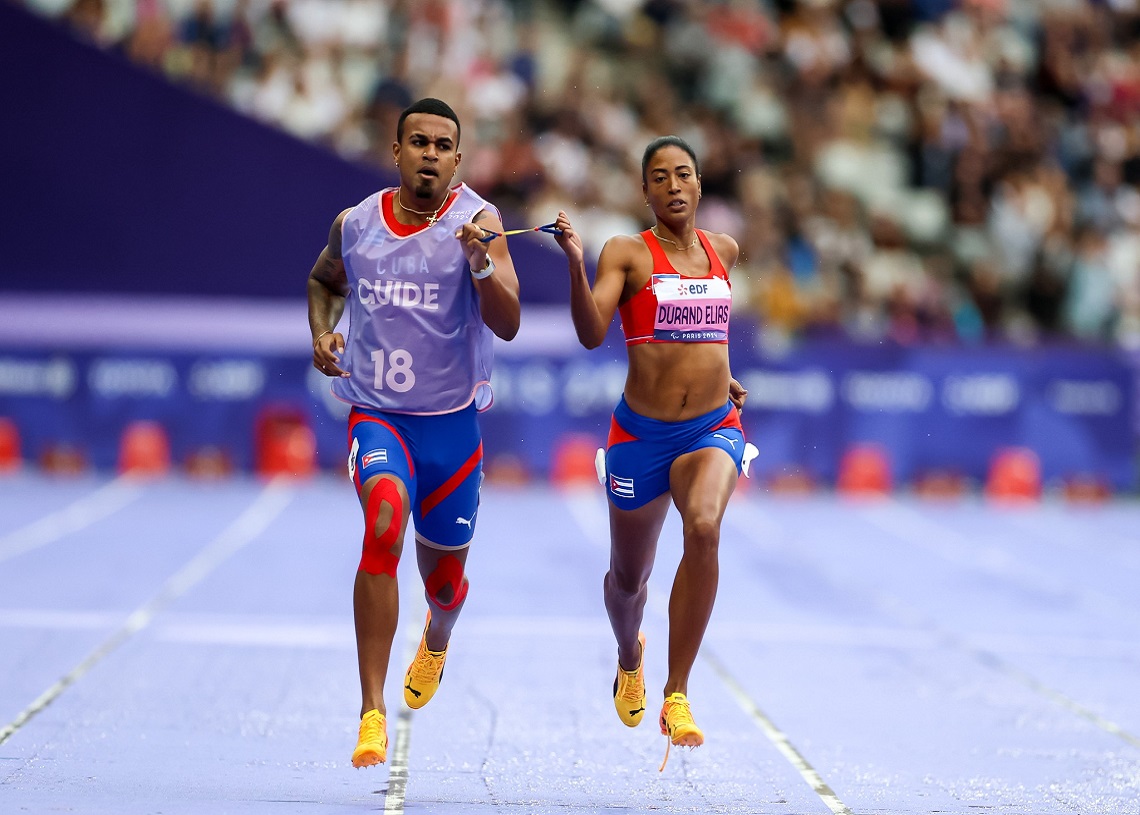
“Omara is an exceptional athlete and I had to adapt to her because she is the one who set the timer, the one who crossed the finish line first. During training, I imposed a pace, sometimes above her usual levels, with the aim of seeing her response capacity. We were constantly testing ourselves. One day I was a little ahead of her and when she matched that pace, it stuck in her head. So, in the competition, we didn’t get ahead of ourselves, we simply read what we needed and ran like that,” Yuniol says.
With this formula, they set the standard for almost a decade, a period in which the unknown of their careers was whether they were going to break records because their supremacy was not a matter of debate. In this regard, Kindelán assures that they never went out to look for records, only to run hard: “Of course, when we arrived at a competition after good periods of training, we knew that the possibilities were greater, but sometimes when we were at our best, they did not happen and other times, without reaching the maximum, we did achieve them. These are things that happen in sport. What we always had clear is that one can hold on to records, because then it is difficult to achieve them.”
Tokyo and the obstacle of confinement
On August 25, 2020, the Olympic flame was set to light up the sky of Tokyo, but the coronavirus pandemic froze the flame of the summer event. The world had been in chaos since the beginning of the year and sports did not escape the suspension of events, with dire consequences for all the athletes who were already ready to storm the Japanese capital.
“There was a moment when we realized that the postponement of the Paralympic Games was inevitable. Everyone was in quarantine, nothing could be done and I don’t think anyone knew how and when we would return to normal,” recalls Omara.
So what to do? “We never stopped exercising. We were always working out wherever and however we could. I needed it to maintain my body weight because I tend to gain weight easily, and to not lose muscle tone. That was essential because if you lock yourself at home without training at all, your muscles start to weaken and when you start again it’s hard for you.
“Also, we’ve been practicing sports for many years and the heart is adapted to that routine. When you drop your levels too much, so suddenly, you’re at risk of anything happening to you, even sudden death. So, we had to find a balance through exercise,” explains Omara, who spent 5 months without working with Yuniol Kindelán.
Omara Durand and Yuniol Kindelán spent 5 months without working together before the Tokyo Paralympic Games. Photo: Otmaro Rodríguez.
“He was on his side and I was on mine. There was no other option. In the end, we started training together in September 2020, already thinking about the Tokyo Games, which were scheduled for August of the following year. Let’s say that it was a setback to be apart, but the same thing happened to everyone. Our rivals also had to isolate themselves, avoid contagion at all costs, and work when the conditions were right,” recalls the sprinter.
The preparation was challenging, although for them it did not represent a major problem: “As we have already said, we can stop training without the rope for as long as we want and when we run with it again, we do so without difficulty. That is thanks to years of work, experience, and understanding,” says Omara.
And indeed, in Tokyo, there were no cracks in the preparation and they dominated from start to finish, even with a world and Paralympic record in the 200-meter finals. Once again they looked in the rearview mirror at all their rivals, surrendered to the reign of the Santiago native.
Paris and the final stretch
Retirement did not cause Omara Durand any headaches. She accepted the process as something natural, marked the times in the calendar, and decided to stop at the peak of her career, after reaching 11 Paralympic titles in Paris.
The French capital saw her rise to the top again in 3 events. In each of the,m she shone, running against time, against the stopwatch, her true opponent: “That is what we train for, to improve our times. We know that we have no rivals, the runners from other countries themselves say so. But that does not mean that it is comfortable, nor does the fact that we have a big advantage mean that it is comfortable. We always go hard, we try our best, it is not for fun that we train so much.”
Paris 2024 involved an exercise in self-control for the simple reason of facing 9 races in a period of 6 days, the highest total of her entire summer career: “The calendar forced us to pace ourselves. In some cases we only ran to qualify, without many demands, which allowed us to lower the pace a little, but always very focused, because at the slightest mistake, we would risk disqualification. Everyone was watching Omara and nothing could fail.”
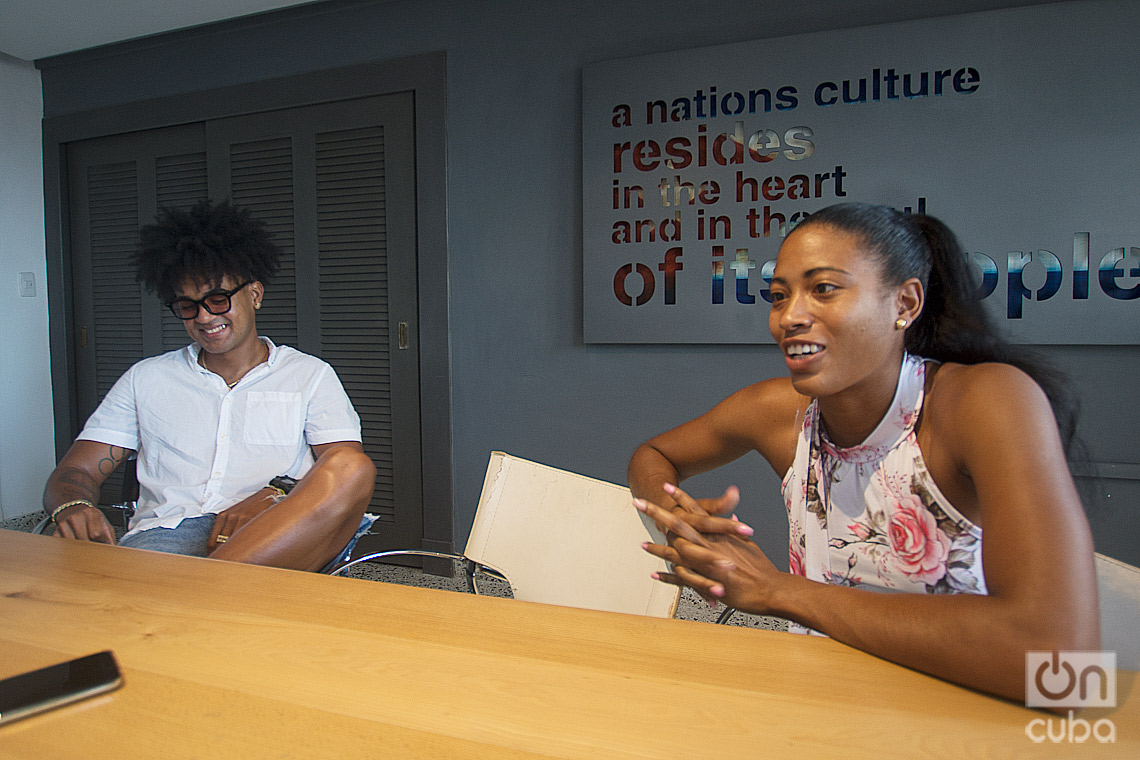
Fortunately, there was no slip-up in the City of Light, which saw her say goodbye in tears and shining, only with gold medals on her chest. In her last stretch, she opened the turbines again and put distance between herself and her rivals, without any pressure: “When you are the best in the world, everyone is ready to beat you, but that never weighed on us. We work with our hearts and with great dedication to achieve a goal and we almost always achieve it.”
The place of honor in the Cuban Paralympic movement was then vacant, and it was now forced to look for another reference for the next cycles. Yuniol Kindelán was also left alone, without a partner to share the rope with while running on the track. Omara’s goodbye probably also implies his farewell, although there is always an open door.
“I have only run with Omara and the idea was always that when she finished I would follow in her footsteps because I have been doing this for a long time. Although I don’t like to be absolute if someone appeared and I could maintain the motivation, maybe I would try for a few more years, after all, sport is what I like.”
Farewell letter
“Dreams are always there and one goes after them. In sports, the first thing I dreamed of was participating in an international event, and that’s what happened. Then I decided to grow as an athlete and have many results, and that also happened. But the most impressive thing about this whole journey is that there are things that I never imagined and they happened. I attribute that to the daily effort, to the dedication and to the great love that I feel for athletics.
“I am still young, but I have been practicing sports for many years, something that can only be defined with one word: sacrifice. Although it requires a lot of concentration, the most difficult thing is not competing, but training. Sections and kilometers covered, weights, jumps; morning and afternoon; with sun or cold. There is no way to explain the exhaustion. I wish we could compete without training.…
“And I wish we could also compete without injuries. I have taken good care of myself, although I have gone through bad times. I came out of the 2019 Doha World Cup in tatters and ended up in an operating room. I recovered and competed again, but high-performance sport demands intensity. High-performance sport forces your heart to beat hard because in a competition you go to the maximum, you always give the extra.
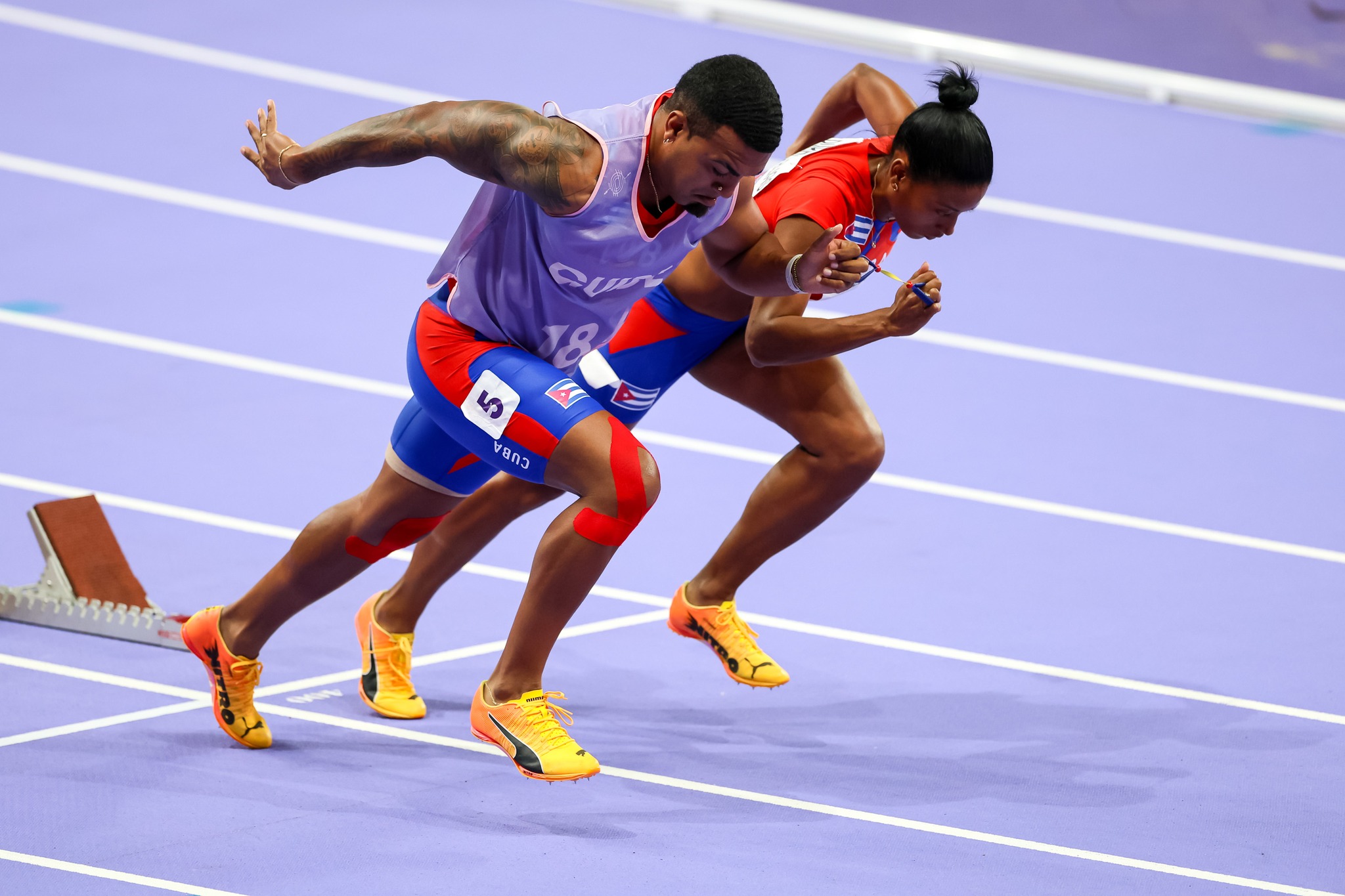
“That’s why I decided not to run anymore after Paris. From now on I want to grow my family. I hope life gives me the blessing of having another child, I’m going to try. I’m also going to try to have an eye operation, I’d like to see a little more, study, improve myself and, of course, support Cuban sports in whatever is necessary.
“Up to this point, I have to give thanks. I don’t feel famous, but I’ve received so many recognitions that I can hardly believe it. I’m so proud of that. The only way I can give back is by being kind to everyone. Sometimes I am exhausted and want to spend time with my family, but I am reciprocal with the people who recognize my work. Therefore, I greet those who greet me, and those who ask me for an interview I gladly give it. It is nice, it is enjoyable.
“I am not sure I deserve so much, but I think it is a reward for how perseverant I have been. In some way, as Paralympic athletes, we have become a paradigm.”










